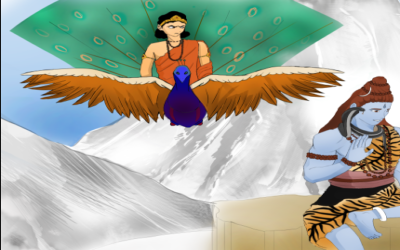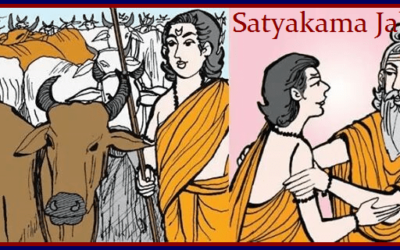Nachiketa can only be introduced as the ideal child of Hinduism. His authenticity is such that no one could have dreamt of such a unique and genuine character. He is the protagonist of the Katha Upanishad and the embodiment of trust, honesty, innocence and seeking.
First, Nachiketa’s story needs to be told before his character can be expanded upon. Nachiketa, a young boy of seven lived comfortably as the prince of a wealthy kingdom. The young boy’s father, Vajashravas, was a great king with abundant wealth. He loved his son and considered his son Nachiketa to be very precious. Vajashravas, in his old age began to perform charity in order to gain merit so that he may reach heaven after death. In the name of charity, he gave away all the worst things that he possessed, such as cows that were old and no longer gave milk.
Here, there are two flaws in Vajashravas’ beliefs. Firstly, he believes that he can have worldly pleasures after leaving his body, and attempts to make arrangements for life after death. Secondly, he thinks that charity (sincere or insincere) will allow him to access heaven. Nachiketa immediately recognizes hypocrisy in his father and stands firm in what he believes as the truth. He takes responsibility. However he doesn’t aim to hurt his father in any way.
Nachiketa, who wishes to subtly remind the king that he is supposed to be giving away his most prized possessions, asks with all his authenticity, “To whom will you give me?” In this one statement, we can see the beauty of the inner space of the child. He is ready to be given away as a servant for the rest of his life because he wants to prevent his father from falling from his identity. Even though his father is the source of his life, he fearlessly reminds his father of the truth. Sri Paramahamsa Nithyananda declares that Nachiketa stands with “ferocious innocence.” And he does. His innocence is such that it cannot be shaken by anything including the insecurity of his own future.
Vajashravas is shaken, and out of arrogance and anger he responds, “I give you unto death!” Nachiketa, still unwavering, goes to the gates of the Lord of death, Yama, and waits there for three days and three nights, for Yama was away. When Yama returns to his abode, he is surprised to find a brahmin waiting for him and he offers the boy three boons to make up for the three nights of inhospitality.
Nachiketa, instead of asking for worldly pleasures, asks the Lord of Death to tell him the secret of life and death. Yama responds by saying:
“Ask for sons and grandsons who will live
A hundred years. Ask for herds of cattle,
Elephants and horses, gold and vast land,
And ask to live as long as you desire.
[…] Ask for beautiful
Women of loveliness rarely seen on earth,
Riding in chariots, skilled in music,
To attend on you. But Nachiketa,
Don’t ask me about the secret of death.”
The Lord of Death offers Nachiketa an escape from death. He wants to know whether this boy is worthy of receiving the truth. To this Nachiketa responds:
“These pleasures last but until tomorrow,
And they wear out the vital powers of life.
How fleeting is all life on earth!”
As a seven-year-old child, he understands that wealth is lost once death arrives and therefore there is no greater boon than knowing the truth. Even heaven cannot tempt Nachiketa because he realizes that it is nothing more than a multiplication of the pleasures of earth. He finds it insignificant to rejoice in the pleasures of life after staring death in the face and he only wishes to know the secret of death. He wishes to gain the ultimate.
This maturity seen in Nachiketa far surpasses the maturity of Vajashravas, and in this moment he becomes the ideal child hero. Yama then imparts upon Nachiketa the secrets of life and death.
By studying the story of Nachiketa and the Katha Upanishad, one gains tremendous understanding of the power of innocence. Nachiketa’s innocence and lack of arrogance enabled him to boldly face death and question the very purpose of existence. In surrendering to death, he does not become powerless, but instead gains immortality himself.
Swami Vivekananda says about Nachiketa, “Have faith, as Nachiketa. At the time of his father’s sacrifice, faith came unto Nachiketa; I wish that faith would come to each of you; and everyone of you would stand up a giant, a world-mover with a gigantic intellect — an infinite God in every respect. That is what I want you to become. This is the strength that you get from the Upanishads, this is the faith that you get from there.” He declares that faith makes each of us into God. He declares that we should all aim to be as authentic as Nachiketa. So Nachiketa stands as the ideal and as a true example for what everyone should seek to achieve.
References:
- “Naciketa, The First Ideal Child Hero For Humanity” https://www.youtube.com/watch?v=pFGKwCrEAEU
- “Don’t Allow Free Fall From Your Authentic Identity” by Swami Nithyananda https://www.youtube.com/watch?v=oM4yv-2j4cw
- The Complete Works of Swami Vivekananda



0 Comments